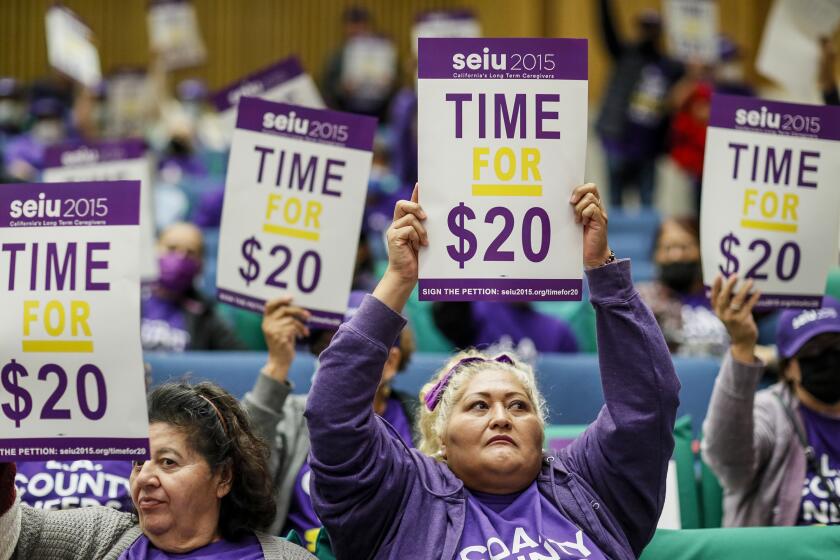Politics 88 : Dukakis Hits Out at Two Top Rivals : Chides Gephardt on Tax Vote, Raps Gore for Inexperience
Massachusetts Gov. Michael S. Dukakis, ordinarily a restrained and low-key competitor, pounded away Saturday in a televised campaign debate at Rep. Richard A. Gephardt and Sen. Albert Gore Jr., two of his chief Democratic presidential rivals in the March 8 Super Tuesday primaries.
Meanwhile, the fourth major figure in the forthcoming contest for Southern convention delegates--the Rev. Jesse Jackson--tried to position himself above the battle as a guardian of party unity during the debate, which was broadcast nationally by Cable News Network. After a heated exchange between Gephardt and Dukakis, Jackson warned: “My fear is that in this level of debate we’ll be kind of like a cross-eyed archer shooting arrows past the people.”
Touched Off Fireworks
Dukakis, who normally only strikes at his opponents after they have attacked him, touched off the fireworks by challenging Gephardt over his vote for the 1981 Reagan tax cut. That measure is blamed by many Democrats for the nation’s two biggest economic headaches--the budget deficit and the trade deficit.
“Are you proud of that vote for the 1981 tax bill?” Dukakis asked. “Yes or no, are you proud of that?”
“Mike, I’m proud to have lowered taxes on people earning $50,000 or below,” the Missouri congressman replied. “I certainly am.”
But Dukakis persisted: “Even though it resulted in massive deficits, turning this nation from the largest creditor nation in this world to the largest debtor, creating most of the trade problems you’ve been talking about for the past several months and opening up loopholes to the wealthy? You’re proud of that bill?”
Gephardt Hits Back
Gephardt hit back by accusing Dukakis of raising taxes during his tenure as governor of Massachusetts “on ordinary average middle-income taxpayers.” And Dukakis, who did raise taxes during his first term as governor, pointed out that he had cut them during his second.
Dukakis then took out after Gore, who has argued that as a governor Dukakis was short of experience in foreign policy. “Al Gore has never run a government, never balanced a budget, never picked a cabinet . . . all things that are a little different from serving in the legislature.
“The only time he ever conducted negotiations was the MX negotiations, in which the Administration took him to the cleaners,” Dukakis said.
This was a reference to Gore’s 1983 agreement with the Reagan Administration to support funding for the MX missile. In return for the support of the Tennessee senator and other Senate Democrats, the Administration pledged to pursue strategic arms negotiations with the Soviets and develop the Midgetman, a single-warhead missile--promises that critics say Reagan has failed to keep.
“It’s not your resume (or) the length of time you have spent in Washington” that matters, Dukakis contended. “It’s your values, it’s your strength, it’s the qualities of your appointees, it’s your ability to work with Congress, respect the law and understand the force of change in the world.”
In responding to this attack, Gore noted that Dukakis had “raised a question about my experience versus his. I served my country in Vietnam. I’ve run a farm. I’ve run a small business. And for the last 12 years (in Congress) I’ve fought on the side of average working men and women in this country against some of the most powerful interests in this nation.
‘On-the-Job Training’
“We have seen the consequences for the last seven years of having a President who needed on-the-job training in foreign policy. That’s why we’ve had birthday cakes for the Ayatollah. That’s why we’ve had these secret dealings with drug smugglers in Panama and perhaps elsewhere.
“Now you can’t just skate around the question (of experience),” Gore insisted. “It is important.”
Illinois Sen. Paul Simon, hanging on to his so-far-winless candidacy by a thread, interjected himself into the argument on Gore’s side, and against Dukakis, whose liberal support Simon covets: “A resume is not a guarantee that you’re going to know anything about foreign affairs,” Simon said. “But the resume can indicate whether you have some experience. You would (consider a resume) if you were hiring someone in your business.”
And then Simon went on to stress his own experience in foreign affairs as a member of the Senate Foreign Relations Committee and as a former member of the U.S. delegation to the United Nations.
Dukakis’ attack on Gore produced another warning from Jackson about the threat of divisiveness. “One of the dangers of our taking potshots at each other,” he said, is that “it will make headlines but not make a difference. It will not lead to jobs, peace or health care.”
Hart Challenge
During a discussion of Middle East policy, former Colorado Sen. Gary Hart challenged the other candidates to criticize Israel. Declaring himself “outraged” at Israeli treatment of Palestinian protesters, Hart said: “I’ve said it before and I’ll say it again, Israel is wrong. No other candidate on this stage is willing to say that.”
“I said it first,” Jackson asserted.
But Hart insisted that Jackson’s criticism was not strong enough.
Before the debate, Hart held a press conference in which he reiterated his intention to stay in the campaign, despite his poor showing in the Iowa caucuses, New Hampshire primary and other contests, and his low standing in the polls.
Reminded that when he had re-entered the Democratic race last December, six months after dropping out because of disclosures about his relationship with a Miami model, he had said he would “let the people decide,” Hart replied: “I’ve heard from the voters, I want to hear from a few more.”
Besides, he contended: “There are some things more important than winning. One of them is telling the party what needs to be said.”
Three Main Issues
Hart said the three issues he was most interested in are reform of defense policy and military spending, reduction of the budget deficit and a change in U.S. Mideast policy to include more criticism of Israel.
Saturday’s debate, sponsored by the Atlanta Journal and Constitution newspapers, was held at the Georgia World Congress Center, where the Democratic National Convention will be held in July. The Republican candidates will take part in a similar debate today.
The Democratic candidates earlier Saturday joined an often unruly throng that included homeless people from around the country who marched through downtown Atlanta, demanding more help from the government. The crowd, estimated by police at 8,000 to 10,000, often jeered the candidates.
More to Read
Get the L.A. Times Politics newsletter
Deeply reported insights into legislation, politics and policy from Sacramento, Washington and beyond. In your inbox three times per week.
You may occasionally receive promotional content from the Los Angeles Times.






